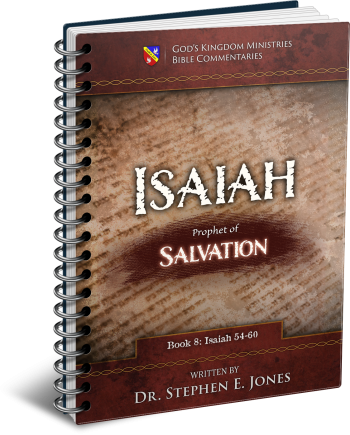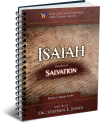Latest Posts
View the latest posts in an easy-to-read list format, with filtering options.

Isaiah is the prophet of Salvation. He is also known as the truly "Universalist" prophet, by which is meant that He makes it clear that salvation is extended equally to all nations and not just to Israel. He lived to see the fall of Israel and the deportation of the Israelites to Assyria, and he prophesied of their "return" to God (through repentance). He is truly a "major prophet" whose prophecies greatly influenced the Apostle Paul in the New Testament.
Category - Bible Commentaries

Isaiah 58 presents a new problem, where believers continue to sin (violate the law), often without realizing it. The prophet points out this specific problem in his own day, but it is highly relevant to us today as well.
There are many who have cast aside the law of God as if it were unrighteous in some way. This is not only true in the Church today, but it has been a problem since the days of Moses and continued into the time of Isaiah. I have heard it said that if one attempts to follow the law, he will fall from grace. Of course, if I were to steal from them, they would immediately want restitution, even though—if their own words were true—they would fall from grace for appealing to the law for justice.
Justification is by faith alone and is set forth in the meaning of Passover. Sanctification comes through Pentecost, which is a celebration of the giving of the law at Mount Horeb. Pentecost brings obedience and discipline to believers. In Pentecost the law becomes the standard of Christian behavior while the Holy Spirit changes our hearts and our way of life to conform to the image of Christ.
Those who disagree with the law are those who do not understand it. Many do not even read it. Those who do read it tend to believe that the law applies to Jews only. But Paul asserts clearly that God has no double standards (Rom. 3:9) and that the law convicts the whole world of sin (Rom. 3:9, 19).
Further, unless one has a clear understanding of the distinction between the Old and New Covenants, they will find it nearly impossible to understand Paul’s writings. He did not cast aside the law but put it in its proper place (Rom. 3:31). He wrote against lawlessness in Rom. 6:19. Lawlessness is sin (1 John 3:4).
In Isaiah 58:1, 2 God commands the prophet,
1 “Cry loudly, do not hold back; raise your voice like a trumpet, and declare to My people their transgression and to the house of Jacob their sins. 2 Yet they seek me day by day and delight to know My ways, as a nation that has done righteousness and has not forsaken the ordinance of their God. They ask Me for just decisions, they delight in the nearness of God.”
By all outward appearances, the people seemed to love God, seeking Him “day by day,” and even delighting to know His ways. Neither had they “forsaken the ordinance of their God.” They wanted to know the will of God and delighted to draw near to Him.
Has there ever been such a nation in history? The prophets say nothing of such a nation, except, perhaps, during revivals now and then. God’s word to Isaiah here is not to be taken at face value, as if God were well satisfied with their faith and obedience. How do we know? Because God was telling the prophet to “declare to My people their transgression.”
So by telling them how righteous they were, God was lathering them before a shave. The nation had the appearance of righteousness, and the people really believed that their religious practice was pleasing to God. They were sincere believers, but they lacked a deeper revelation of the law. Hence, they did not know how they were displeasing to God. Although they followed all of the rituals of the temple, they did not truly understand what God expected of His people.
So God told the prophet to explain it to them. Make it plain. Make it understandable. Yet we know that unless God would actually open their eyes and ears to receive such revelation, the truth was sure to go over their heads. It is the same even today, for many have read the words of the prophets but have not truly grasped the essence of their revelation. So let us pray that our own ears and eyes would be healed as we search the mind of God.
In Isaiah 58:3 the people who seek God question Him, saying,
3 “Why have we fasted and You do not see? Why have we humbled ourselves and You do not notice?”…
This is the heart cry of many believers. Why are there so many unanswered prayers? The complaint is real and commonplace. The sincere believers had fasted and prayed, seeking answers from God, but God did not seem to pay attention to them. What more could they have done to catch God’s attention?
In my experience, I have found that this is probably the most pressing issue for believers throughout history. Gifted miracle workers and healers seem to have gotten God’s attention, but what about the average person? What did the healers do that the average person failed to do?
Again, even famous healers have struggled with the same question, for not all are healed through their prayers. So in the end, everyone has struggled with this question, myself included. In the 1980’s, I thought that the answer must surely be found in long fasts. I could never go beyond 21 days of fasting, so I thought that perhaps a 40-day fast would give me answers.
Further prayer and revelation, however, told me that this was not the answer either. Fasting is good and serves a good purpose, but one should not use fasting like a hunger strike. We cannot tell God, “I will eat nothing until You answer my prayer.” Prayer, after all, is mainly designed to seek the mind of God until we know how to pray. It is not to force our will upon a reluctant God. This is not a fight with God. We are all Jacobs who fight God until we clearly lose. When our will is aligned with the will of God, we win, and we rule as Israel.
When we know His mind, when we know what He is currently declaring from heaven, then we are able to bear witness in earth. In this way, we bring heaven to earth incrementally, and the Kingdom of God progresses accordingly.
God then gives the answer as Isaiah 58:3 continues,
3 … Behold, on the day of your fast you find your desire and drive hard [nagas, “exert demanding pressure”] all your workers [atsab, “servants, hired laborers”].
The day of your fast is a specific reference to the Day of Atonement, which was a national day of fasting every year on the tenth day of the seventh month. The day was established after the people believed the evil report of the ten spies (Num. 13:32). This report was given on the 50th Jubilee from Adam. They should have blown the trumpet of the Jubilee, signaling the time to return to their lost inheritance. However, they walked by sight and lived by fear, and so they refused to enter the Kingdom at that time. This is what turned their Jubilee into a Day of Atonement, from jubilation to mourning and fasting.
Hence, the purpose of fasting on that day was to repent of following their own lack of faith and to conform to the will of God. The fast was never intended to force their own will upon God. When men fast to establish their own will and desire, they misuse the principle of fasting. This is God’s criticism in Isaiah’s time.
Isaiah 58:4 says,
4 Behold, you fast for contention and strife and to strike with a wicked fist. You do not fast like you do today to make your voice heard on high.
Rotherham’s The Emphasized Bible renders this better,
4 Lo! For strife and contention ye fast, and to smite with the fist of lawlessness—Ye shall not fast as today to cause to be heard on high your voice.
God criticized the people for fasting with the spirit of “strife and contention.” They were fasting to fight the will of God, rather than to conform to it. This was “the fist of lawlessness.” The Hebrew word for “fist” is egrof, which implies grasping something. When we fast to grasp that which we want (or believe we should have), rather than to seek God’s will and desire, we contend with God out of a spirit of lawlessness.
God’s response to such fasts is: “Ye shall not fast as today to cause to be heard on high your voice.” In other words, stop using this fast to force God to “hear your voice,” i.e., to give you what you want.
Isaiah 58:5 continues,
5 Is it a fast like this which I choose, a day for a man to humble himself? Is it for bowing one’s head like a reed, and for spreading out sackcloth and ashes as a bed? Will you call this a fast, even an acceptable day to the Lord?
These are rhetorical questions. The answer in both cases is obviously NO. Men have done such things for thousands of years to no avail. Such outward trappings were being used as tools to get their own way. God sees through their false humility. He knows that these religious people were just humbling themselves outwardly as a ploy to get God to change His mind and grant them the desires of their lawless hearts.
“Will you call this a fast?” They do so but should not.
In fact, the purpose of the Day of Atonement and its fast is to prepare one’s heart to declare a Jubilee. It is to reverse the decisions of the people who listened to the evil report of the ten spies. It is to hear and obey God’s word, because faith comes by hearing (Rom. 10:17). By conforming to the word of God and by seeking to bring the will of heaven into the earth, our minds are renewed.
In this way we follow the example of Caleb and Joshua. This is how we become overcomers, enlightened by the law of Jubilee.